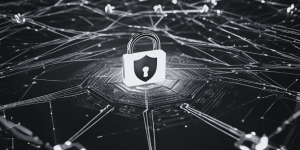How to Secure your Crypto Wallet from Potential Hacking Threats

Reading Time: 3 Minutes
Introduction
In recent times, heaps of first-timers have been drawn to cryptocurrencies, allured by stories of hefty profits. While digital currency pulls in those eager to invest, it equally draws in less savory characters – hackers and swindlers itching for their next hit. Securing your crypto wallet is therefore an essential aspect of investing in cryptocurrency.
Common Crypto Wallet Security Issues
Crypto assets, while offering a new horizon of financial possibilities, come with their own unique set of challenges. Unlike your average bank account which stands firm come rain or shine; cryptocurrency feels more like sailing choppy seas. Market shifts happen fast enough to give you whiplash while dodging cybersecurity threats alongside our own blunders makes it quite the adventure.
Beware, these elements can lead to a fast and total loss of your money invested. You’ve got to recognize what could go wrong – understanding this can really protect the money you put into your projects.
Malware and Cyber Threats
Hackers can deploy various forms of malicious software, such as Trojans and spyware, with the intention of hijacking your private keys, gaining access to your funds, or commandeering your transactions. Some malware may encrypt or delete your data unless a ransom is paid, leading to the disappearance of your cryptocurrency holdings.
Phishing Schemes
Phishing is a deceptive practice where scammers attempt to fool you into divulging sensitive information, including passwords, account details, or security codes.
Through counterfeit emails, messages, or calls that seem to originate from trusted sources like your cryptocurrency wallet, exchange, or bank, scammers will prompt you to follow a link, download a file, or confirm your identity. Succumbing to these deceitful tactics can result in the exposure of your login information or your device being infected with harmful software.
SIM-Swap Fraud
In a SIM-swap scam, fraudsters manage to take control of your phone number by persuading your cell phone carrier to activate a new SIM card under their control. With your phone number in their hands, they can easily bypass any two-step verification processes implemented by your cryptocurrency wallets or exchanges. This breach allows them to change your passwords, invade your accounts, and reroute your funds to their possession.
See Also: So you want to be a hacker?
Offensive Security and Ethical Hacking Course
How to Keep Crypto Safe?
1. Use VPN for Any Operations
When you log into an exchange, transfer assets, simply surf the Internet, check your email or place bets, use a VPN. If security is important to you, you must use a VPN for protecting your Stake and others crypto wallets, including when replenishing your wallet or withdrawing funds. When you use a VPN for Stake or other activities, you encrypt all data transmitted and hide your identity. Advanced providers like VeePN can anonymize the user and prevent surveillance, phishing, spoofing or data interception.
2. Use Biometric/Facial Recognition
In situations where your phone might be accessed by others, taking advantage of enhanced security features is crucial. The BitPay Wallet provides additional protection for your assets through optional security measures such as fingerprint scanning, facial recognition, and PIN screen locks. These features help guard against unauthorized access and ensure your privacy is maintained. To activate these security options, simply go to Settings, select Security, and then choose the Lock App option.
3. Enable Two-Factor Authentication (2FA)
To bolster your digital security, it’s crucial not just to create strong passwords but to also set up two-factor authentication (2FA) wherever feasible. Aim for the most secure form of 2FA you can access, with a hardware security key, like Yubikey, being the gold standard. You can get more protection with a VPN even when using 2FA, since the technology hides the real password from anyone who might eavesdrop on your network. Should a service not accommodate Yubikey, an authentication application such as Google Authenticator is a preferable alternative to SMS-based 2FA when available.
4. Use a Secure Platform
Selecting a digital wallet demands opting for a platform that is both secure and well-regarded. It’s crucial to undertake thorough research to verify that the chosen platform maintains a solid reputation and implements strong security protocols to safeguard users’ private keys.
Taking the time to investigate can significantly enhance the safety of your digital wallet. Engaging exclusively with reputable entities within the industry can substantially reduce your exposure to risk.
5. Back Up Your Wallet
It’s crucial to write down your recovery phrase immediately after setting up a new wallet or key. Self-custody wallet services, such as BitPay, prioritize granting you full control over your funds. Consequently, they do not keep a backup of your seed phrases. Failing to document your seed phrase before losing access to your wallet will likely result in the loss of your funds. There are several safe methods for storing your recovery phrase, including using lockboxes, safes, engraving on metal plates, or simply pen and paper. On the other hand, storing it in any internet-connected location, such as emails, password managers, or note apps, poses a risk of hacking and should be strictly avoided.
6. Keep Software Updated
To ensure the safety of your bitcoins and additional cryptocurrency assets, it’s crucial to keep your software up-to-date. Newer versions of wallet software come equipped with the latest security enhancements and patches, providing stronger defense mechanisms for your digital currencies. It is important to regularly update the software and operating systems on your mobile devices and computers to maintain the highest level of security for your cryptocurrency investments.
Conclusion
Ensuring the security of your cryptocurrency is increasingly important as the digital finance landscape expands. Crypto assets face a myriad of risks, but armed with the proper knowledge and strategies, you can substantially lessen those risks.
This article is written by Kim Flynn
Are u a security researcher? Or a company that writes articles about Cyber Security, Offensive Security (related to Information Security in general) that match with our specific audience and is worth sharing? If you want to express your idea in an article contact us here for a quote: [email protected]


















